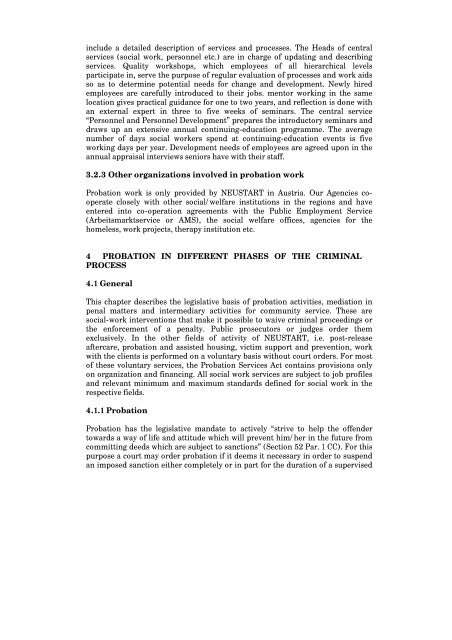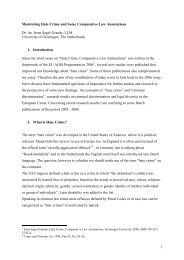Chapter 2 Austria - CEP, the European Organisation for Probation
Chapter 2 Austria - CEP, the European Organisation for Probation
Chapter 2 Austria - CEP, the European Organisation for Probation
You also want an ePaper? Increase the reach of your titles
YUMPU automatically turns print PDFs into web optimized ePapers that Google loves.
include a detailed description of services and processes. The Heads of centralservices (social work, personnel etc.) are in charge of updating and describingservices. Quality workshops, which employees of all hierarchical levelsparticipate in, serve <strong>the</strong> purpose of regular evaluation of processes and work aidsso as to determine potential needs <strong>for</strong> change and development. Newly hiredemployees are carefully introduced to <strong>the</strong>ir jobs. mentor working in <strong>the</strong> samelocation gives practical guidance <strong>for</strong> one to two years, and reflection is done withan external expert in three to five weeks of seminars. The central service“Personnel and Personnel Development” prepares <strong>the</strong> introductory seminars anddraws up an extensive annual continuing-education programme. The averagenumber of days social workers spend at continuing-education events is fiveworking days per year. Development needs of employees are agreed upon in <strong>the</strong>annual appraisal interviews seniors have with <strong>the</strong>ir staff.3.2.3 O<strong>the</strong>r organizations involved in probation work<strong>Probation</strong> work is only provided by NEUSTART in <strong>Austria</strong>. Our Agencies cooperateclosely with o<strong>the</strong>r social/welfare institutions in <strong>the</strong> regions and haveentered into co-operation agreements with <strong>the</strong> Public Employment Service(Arbeitsmarktservice or AMS), <strong>the</strong> social welfare offices, agencies <strong>for</strong> <strong>the</strong>homeless, work projects, <strong>the</strong>rapy institution etc.4 PROBATION IN DIFFERENT PHASES OF THE CRIMINALPROCESS4.1 GeneralThis chapter describes <strong>the</strong> legislative basis of probation activities, mediation inpenal matters and intermediary activities <strong>for</strong> community service. These aresocial-work interventions that make it possible to waive criminal proceedings or<strong>the</strong> en<strong>for</strong>cement of a penalty. Public prosecutors or judges order <strong>the</strong>mexclusively. In <strong>the</strong> o<strong>the</strong>r fields of activity of NEUSTART, i.e. post-releaseaftercare, probation and assisted housing, victim support and prevention, workwith <strong>the</strong> clients is per<strong>for</strong>med on a voluntary basis without court orders. For mostof <strong>the</strong>se voluntary services, <strong>the</strong> <strong>Probation</strong> Services Act contains provisions onlyon organization and financing. All social work services are subject to job profilesand relevant minimum and maximum standards defined <strong>for</strong> social work in <strong>the</strong>respective fields.4.1.1 <strong>Probation</strong><strong>Probation</strong> has <strong>the</strong> legislative mandate to actively “strive to help <strong>the</strong> offendertowards a way of life and attitude which will prevent him/her in <strong>the</strong> future fromcommitting deeds which are subject to sanctions” (Section 52 Par. 1 CC). For thispurpose a court may order probation if it deems it necessary in order to suspendan imposed sanction ei<strong>the</strong>r completely or in part <strong>for</strong> <strong>the</strong> duration of a supervised




![AGIS2 Nov 08 Conference Report_[Version 2] - CEP, the European ...](https://img.yumpu.com/50764570/1/190x245/agis2-nov-08-conference-report-version-2-cep-the-european-.jpg?quality=85)











